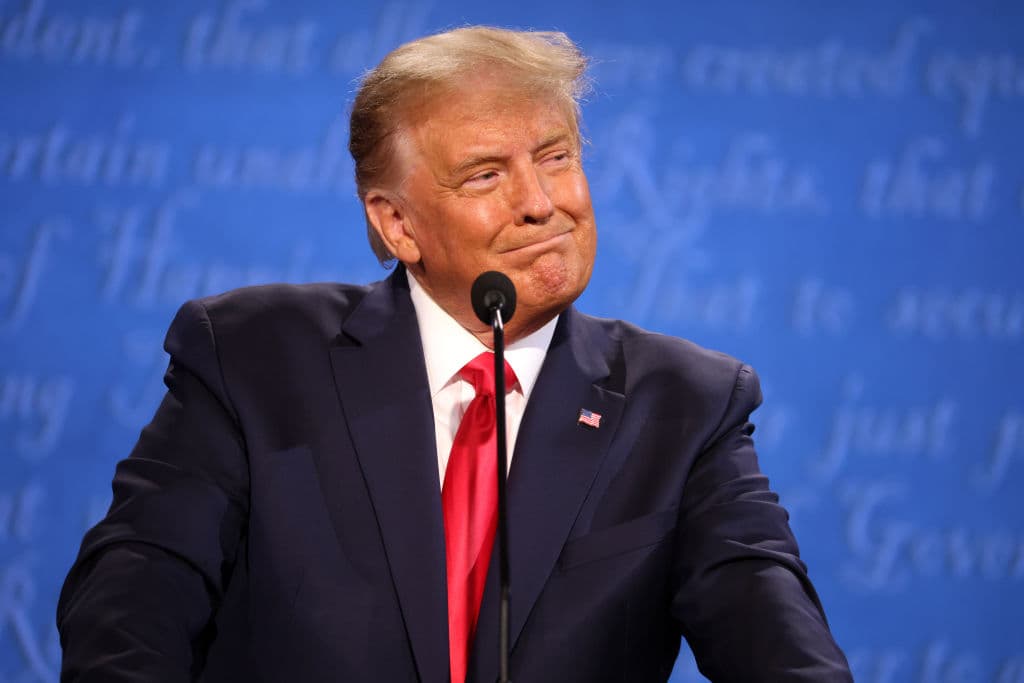The Argument That Could Persuade the Supreme Court To Block Efforts To Disqualify Trump
A legal scholar offers the Sun an exclusive preview of a textual thesis that could appeal to the high court’s cohort of originalists.

The Supreme Court’s refusal to hear a challenge to President Trump’s eligibility for high office shines a spotlight on a constitutional crusade that appears to be approaching an inflection point, just as the time nears to decide who will appear on presidential ballots from coast to coast.
The high court declined to intervene in a case brought by a fringe presidential candidate, John Anthony Castro. He has made disqualifying Mr. Trump from office on the basis of Section Three of the 14th Amendment the goal of his run for president. He was blocked by a district court and filed an emergency appeal with the Nine.
It is the first time the high court has considered a case to disqualify a president. Although it wouldn’t hear Mr. Castro, the issue could come before the Supreme Court again. Cases are percolating in state courts in Minnesota, Michigan, and Colorado. Legal sages — and newspaper opinion pages — are arguing over whether the long-neglected clause stands ready to be activated, even without charges or enabling legislation. Mr. Trump has been criminally charged 91 times across four cases. None of them concern insurrection, which is a prerequisite for the clause to apply.
Now comes one legal scholar, Joshua Blackman, who gave the Sun an exclusive preview of an argument he plans to unveil in a law review article forthcoming this week. Mr. Blackman has been skeptical of efforts to disqualify Mr. Trump from office on the basis of the 14th Amendment. The textual argument he makes could, one day, sway the justices with whom Mr. Trump’s fate may well ultimately rest.
Section Three bars any person from holding federal or state office who took an oath “to support the Constitution of the United States” and then has “engaged in insurrection or rebellion against the same, or given aid or comfort to the enemies” of America. It was passed in the years after the Civil War to keep Confederates from the halls of government.
Mr. Blackman, who is developing his argument with another professor, Seth Tillman, points to the Constitution’s focus on blocking insurrectionists in their ability to “hold any office, civil or military, under the United States, or under any State.” The national parchment, Mr. Blackman explains, precludes the holding of office, not appearing on the ballot. The fear was that people with foreign allegiance would wield power, not that they would compete for votes.
If the Constitution comes in against the holding of office rather than against appearing on a ballot, then the cases against Mr. Trump fail not for defects in standing — the requirement that a litigant have a concrete stake in the outcome of a suit, a bar Mr. Castro failed to clear in federal court — but for a related reason referred to as “ripeness.”
The professor explains that ripeness means that, “like a fruit,” some cases can be unready and appear before a court at a premature stage. If Messrs. Blackman and Tillman are right, then the Constitution’s requirement that courts hear only “cases” or “controversies” — live disputes — would be met only when Mr. Trump is on the verge of holding office.
To support the position that, as he puts it, the disqualification clause is about “holding office,” Mr. Blackman points to another creation of the 19th century, the 1872 Amnesty Act, which declared that “all political disabilities imposed by the third section of the fourteenth article of amendments of the Constitution of the United States are hereby removed.”
If the “disabilities” of the 14th Amendment applied to office holders — not ballot candidates — then in order for them to be removable, the suspected insurrectionist would have to not only run for office but also hold it. Otherwise, the attempted amnesty would have been frustrated. If, say, the president was removed under the 14th Amendment, the vice president would assume the highest office in the land.
History — near and distant — appears to confirm the argument that disqualification will only be possible on Inauguration Day. The only time Section Three was successfully used in the 20th century was against a socialist congressman, Victor Burger, who had been elected to office but not yet seated. He was convicted under the Espionage Act for opposing America’s entry into World War I and was ultimately seated after the Supreme Court overturned that conviction.
In this century, only one person has been disqualified from office on the basis of the 14th Amendment. That would be a county commissioner in New Mexico who was judged by a state court to have been an insurrectionist for his actions on January 6, 2021, Couy Griffin. He held his office when he was barred from it. That case, though, was undertaken under the Land of Enchantment’s quo warranto statute, a state version of the 14th Amendment.
Mr. Castro, though, remains optimistic about his chances of blocking Mr. Trump at this early juncture. He tells the Sun that the high court was concerned with the procedural question of standing rather than the substantive one of merit. He adds that the question of whether he is a “bona fide candidate” has been “mooted” by his efforts to “to file to be on the ballot in New Hampshire, Arizona, Massachusetts, Connecticut, and many other states.”

